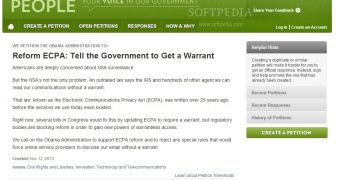Google may not have joined anti-mass-surveillance coalitions such as StopWatching.Us, but that doesn’t mean it is standing there doing nothing. The company has announced that it has considerably increased its encryption levels and continues to push for more transparency when it comes to the secretive orders it receives from government institutions.
Now, the company is promoting a White House petition that calls for reform to the Electronic Communications Privacy Act (ECPA), hoping to push forth an amendment specifying that the government should get a warrant for every read email of its citizens.
The petition has nearly 55,800 signatures already, and it needs more in order to gather 100,000 by December 12.
Google has asked its followers via a Google+ post to sign the petition since their online messages deserve the same protection as their physical mail.
The really nice part about this whole thing isn’t necessarily the petition, although that one is great too, but the fact that Google has taken such a public stand to promote this effort and, ultimately, to help give a legal layer of protection to one of its biggest services – Gmail.
The ECPA is an old piece of legislation that has been lacking in many aspects. The law says that any email can be ordered through a simple subpoena under the condition that the message has been sent over 180 days prior or has been opened.
While this may have sounded great twenty years ago, now it’s possible to store incredible amounts of mail, which means that you probably have emails dating several years back, data that is one subpoena away from the authorities’ eyes.
Given the fact that the petition still has some way to go, Google’s effort to promote it means that it really hopes to get it through and, ultimately, on to the tables of Congress members.

 14 DAY TRIAL //
14 DAY TRIAL //